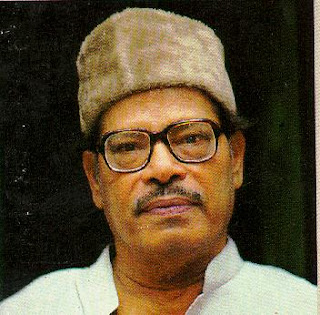
Sunday, December 14, 2008
Rahul dev burman

Sachin dev burman

Sandhya mukherjee

Salil choudhary

Kishor kumar ganguly

Pankaj mullick

Manna dey

Hemanta Mukherjee

Hemanta Mukherjee was born on the 16th of June 1920 in Varanasi. From an early age he had developed an everlasting bond with music. In his autobiography "Ananda-dhara" he mentions " I would always be on the lookout for a chance to sing . Be it a religious festival or just a family gathering I would enjoy singing any new song that I had picked up". His talent was soon recognized and Hemanta Mukherjee sang his first song on the AIR in 1933 at the age of 13. Six years later he cut his first gramophone disc for HMV. Recognition soon followed in the elite music circle of India. In 1940 he sang his first Hindi geet 'Kitna dukh bhulaya tumne'. But commercial success was yet to come. In his own words "I would wait at soirees for organizers to call on me, but singers of the stature of Pankaj Mullick and K.L. Saigal would arrive and I would have to remain content listening to them." But a true genius never goes unrecognized. In 1948, a firebrand lyricist and music composer - Salil Chowdhury teamed up with him and gave birth to a completely new form of music - Kavya-geeti (ballad but not necessarily romantic) . It was immediately a smash hit. To this day the song - 'Ga.Nyer Bodhu'remains the symbol of the once properous rural Bengal. Soon Hemanta received offers from the Bombay film Industry. And after that there was no looking back.
Haimanti Shukla

Chandrabindoo(bangla band)
The band is known for Chandril's satirical, colloquial lyrics, full of references to current affairs and cultural phenomena. They also sing other types of song, written by Anindyo.
They are well known in Kolkata, Dehli and Mumbai and have recently started touring internationally including a performance in aid of the Kolkata based Child In Need Institute (CINI)in LondonBand membersShurojit — guitar Rajshekhar — percussion Chandril — lyricist Anindyo — lyricist/music composer/lead vocals Aroop — bass guitar Upal — music composer/lead vocals Sibu — Keyboard FORMER MEMBERSPritam Arindam Dron Riju ALBUMSAr Jani Na (1997) Gadha (1998) Twaker Jatna Nin (1999) Chaw (2001) Daknam (2002) Juju (2003) Chandrabindaas (compilation, 2005) Ebhabeo Phire Asha Jai (re-working of Ar Jani Na, 2005) Hulabila (2005) U/A (2008)
Anjan dutta

Anjan Dutta's music has been covered by a number of Bengali artists throughout the last decade. More recently, his music has been performed at the 2003 North American Bengali Conference in Long Beach, CA in person. His music has been performed at South Asian culture shows in North America as well.